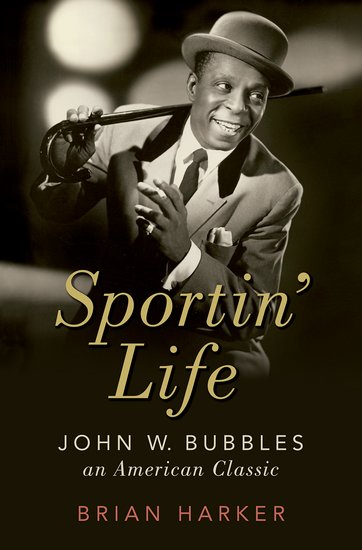Why is Bubbles, one of the most innovative Black entertainers of the twentieth century, not better known today? The short answer that Brian Harker gives in his introduction to Sportin’ Life, the first-ever published biography of Bubbles, is that “he failed to appear in enough films, in strong enough roles, to ensure his immortality.” Because Bubbles was a Black man, especially one with what Pauline Kael called a “slinky sexy” quality, he wasn’t given the chance to show what he could do on film. Could he have produced a legacy of movie performances on the order of Astaire? “We will never know,” Harker writes. But presenting what we can know is a biographer’s work, and Harker has done a first-rate job, shrewdly and thoroughly filling out the life of a complicated man whose career illuminates the possibilities and obstacles faced by a brilliant Black artist during that time.
The book is partly the result of a windfall. In 2012 the personal papers of Bubbles, who died in 1986, were donated to Brigham Young University, where Harker is a professor of music. This cache of photographs, letters, contracts, and more included an unpublished 1969 biography by a writer named Jerry McGuire: Bubbles’s story told largely in his own words. Harker makes the most of the sources that fell in his lap, but he also supplements Bubbles’s version—and, wherever possible, checks and corrects it—with newspaper accounts, census documents, court filings, and the like.
According to Harker’s research, Bubbles was born John William Sublett Jr. in Nashville, Tennessee, likely in 1903—not, as he often later claimed, in Louisville, Kentucky, in 1902. That might seem like a small correction, but Harker goes further, tracing the performer’s lineage back to slavery and revealing that his father, who as a teenager in 1891 was falsely convicted of the attempted rape of a white girl, spent five years in prison. That same father beat Bubbles’s mother, whom the boy adored. Though Bubbles told his life story to the press in great detail—“I remember everything,” he boasted to a reporter for The New Yorker in 1967—he never spoke of any of this.
He did like to recount how precocious he was, how he talked his way into his first professional performances when he was seven. As his family moved to Louisville and then Indianapolis, he won amateur contests as a singer, dancer, and comedian, and an impressed theater manager converted the bubbly boy’s nickname, Bubber, into a stage name. A Black reporter praised the thirteen-year-old Bubbles as “a human sponge” who had absorbed the best of the Black entertainers before him, the kind who mixed blackface with the blues. Self-confidence and boldness were never in short supply, onstage or off.
